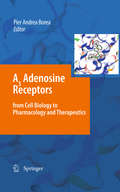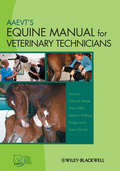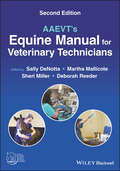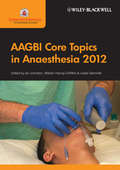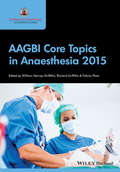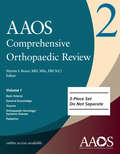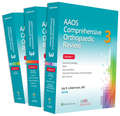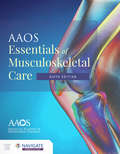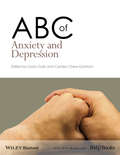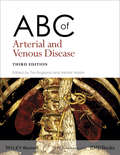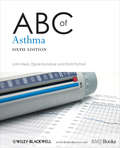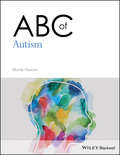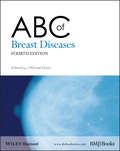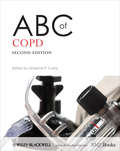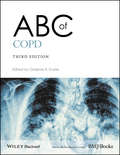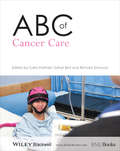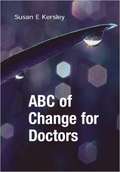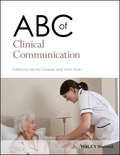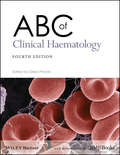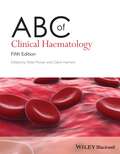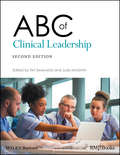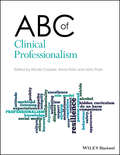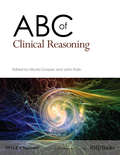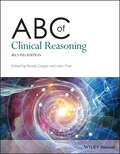- Table View
- List View
A3 Adenosine Receptors from Cell Biology to Pharmacology and Therapeutics
by Pier Andrea BoreaThis book, "A3 Adenosine Receptors from Cell Biology to Pharmacology and Therapeutics", documents the present state of knowledge of the adenosine A3 receptor. Adenosine A3 receptors are G protein-linked receptors that function in physiology and intracellular signaling and are involved in inflammatory responses and mediating cell proliferation and cell death. The A3 receptor is increasingly being recognized for its biological roles throughout the body, and many A3 receptor ligands have proven useful in elucidating peripheral and central pathologies. This book covers a wide range of information including data from studies of theoretical, molecular and cellular pharmacology, signal transduction, integrative physiology, new drug discoveries and clinical applications. The book includes sections on: A3 Adenosine Receptor signal transduction, adenosine Receptor medicinal chemistry, effects and therapeutic applications of Adenosine Receptors on tissues and organs, adenosine Receptors and inflammatory and auto-immune diseases, adenosine Receptors and cancer. The chapters in this book cover both fundamental science and relevant applications and provide an authoritative account of the current status of the field. "A3 Adenosine Receptors from Cell Biology to Pharmacology and Therapeutics" is an up to date and scientifically excellent source of information, attractive to basic and clinical scientists alike.
AAEVT's Equine Manual for Veterinary Technicians
by Deborah Reeder Sheri Miller Dana Zimmel Midge Leitch Deeann WilfongAAEVT's Equine Manual for Veterinary Technicians offers a compendium of information on the care and treatment of horses for equine veterinary technicians. Highly accessible and easy to use, the book builds on the basics of equine care to provide a complete reference for equine nursing and technical skills. AAEVT's Equine Manual for Veterinary Technicians is an invaluable guide for qualified equine veterinary technicians and assistants, particularly those earning their equine certification, vet tech students, and equine practices.
AAEVT's Equine Manual for Veterinary Technicians
by Deborah Reeder Sheri Miller Sally DeNotta Martha MallicoteAAEVT’s Equine Manual for Veterinary Technicians Practical handbook on all aspects of veterinary care in horses relevant to veterinary technicians AAEVT’s Equine Manual for Veterinary Technicians, Second Edition offers a compendium of information on the care and treatment of horses for equine veterinary technicians, building on the basics of equine care to provide a complete reference for equine nursing skills, training, and technical information. The text is specifically geared toward those who already have basic equine knowledge and training and are looking to build upon their foundations. Comprehensive yet accessible, the new edition updates all medical, procedural, pharmaceutical, equipment, staffing, and office management information. Images also appear in full color throughout the book for the first time. Chapters cover a variety of topics ranging from general horse management and nutrition to diagnostics and medical emergencies. Charts, tables, and images support the text to aid in reader comprehension. Sample topics covered in AAEVT’s Equine Manual for Veterinary Technicians include: General horse management, equine nutrition, applied anatomy and physiology, equine reproduction, and equine wellness programs Foal care, equine pharmacology, laboratory diagnosis in equine practice, equine anesthesia, surgical assistance, and nursing care Technical procedures, diagnostic procedures, common equine medical emergencies, equine physical rehabilitation, equine behavior, and equine office procedures An overall explanation of procedures and medical information regarding the care of horses in a clinic or ambulatory practice Highly accessible and easy to use, AAEVT’s Equine Manual for Veterinary Technicians, Second Edition is an invaluable reference for qualified equine veterinary technicians and assistants—particularly those earning their equine certification—as well as vet tech students and equine practices.
AAGBI Core Topics in Anaesthesia 2012
by Ian Johnston Leslie Gemmell William Harrop-GriffithsBased on the Association of Anesthetists of Great Britain and Ireland's (AAGBI) continuing education lecture series, this clinical-oriented book covers the latest developments in research and the clinical application to anesthesia and pain control.
AAGBI Core Topics in Anaesthesia 2015
by William Harrop-Griffiths Richard Griffiths Felicity PlaatBased on the Association of Anaesthetists of Great Britain & Ireland's (AAGBI) continuing education lecture series, this clinically-oriented book covers the latest developments in research and the clinical application of anesthesia and pain control. Reviews latest developments in research and practice Clinically-oriented but rooted in basic science Concise and informative articles on key topics Road-tested through CPD roadshows Designed specifically for continuing medical education
AAOS Comprehensive Orthopaedic Review 2
by Frcs C Martin I. Md, Frcs C Martin I. BoyerAAOS Comprehensive Orthopaedic Review, 2nd edition offers sweeping coverage of the core of orthopaedic knowledge that spans the spectrum of the orthopaedic specialties. Gathered in one convenient and comprehensive text, you'll find the specific information you need to prepare for your examination.
AAOS Comprehensive Orthopaedic Review 3
by Jay R. LiebermanAAOS Comprehensive Orthopaedic Review, 3rd edition offers sweeping coverage of the core of orthopaedic knowledge that spans the spectrum of the orthopaedic specialties. This convenient, comprehensive and user-friendly text combines the specific information you need to prepare for your examination.
AAOS Essentials of Musculoskeletal Care
by AAOSEssentials of Musculoskeletal Care, Enhanced Fifth Edition is a robust educational resource focused on how to evaluate and manage common musculoskeletal conditions.
AARP Special Edition: for a Longer, Leaner, Healthier Life!: The fast, effective weight-loss plan to save you 10, 20, 30 pounds--or more!
by David Zinczenko Eat ThisLose 10, 20, 30 pounds or more, and put yourself back in control of your weight, your health, and your life! Don't diet, don't sacrifice, and don't waste money or time on expensive weight-loss foods. In fact, you can start dropping pounds today while eating all your favorite foods--from pizza and pasta to burgers, and even dessert. From the editors of the bestselling series Eat This, Not That! comes a unique diet program that strips away added sugars and melts fat--from your belly first. The trick: a series of simple swaps that will ensure you're eating the very best options from your favorite restaurants and grocery store brands. Discover how easy it is to indulge your way to a flat belly while protecting your brain and striking a blow against heart disease, diabetes, and more. Eat This, Not That! for a Longer, Leaner, Healthier Life is based on four easy-to-remember nutrition rules: * Use our simple guide to ensure you're always making the smartest, healthiest, leanest choice in any restaurant or grocery store. * Enjoy rich, creamy, healthy fats, so you never feel hungry or deprived, even while your metabolism is revving on high. * Reduce added sugars--without sacrificing flavor--with a series of simple tips that will help you enjoy your favorite desserts, without gaining an ounce! * Power up your day with 10 essential LONGER LIFE Superfoods for maximum health and rapid weight loss. Get ready to drop that extra weight faster than you've ever imagined--and enjoy every bite!
ABC of Anxiety and Depression
by Linda Gask Carolyn Chew-GrahamABC of Anxiety and Depression is a practical guide to the assessment, treatment and management of patients with anxiety and depression as they commonly present in primary care.It begins with an introduction to views on the understanding of anxiety and depression. The following chapters cover how anxiety and depression present in different patient groups such as children and young people, adults, older people and during antenatal/postnatal periods. It then addresses anxiety and depression as comorbidities with chronic illness, and within special populations and settings.The options for treatment and management of anxiety and depression are considered with guidance on when referral to secondary care may be appropriate and the current best practice in psychological therapies, drug treatment and social interventions. Cases are used to illustrate the complexities of managing patients with anxiety and depression.The title concludes with an important chapter on practitioner well-being.ABC of Anxiety and Depression is a practical resource all general practitioners and family physicians working with patients with anxiety and depressive disorders. It is also relevant for primary health care professionals who are part of clinical teams treating patients with anxiety and depression, and conditions where anxiety and depression are common comorbidities, as well as psychologists, counsellors, social workers, and medical and nursing students.
ABC of Arterial and Venous Disease
by Tim England Akhtar NasimABC of Arterial and Venous Disease provides a structured, practical approach to clinical assessment, investigation and management of the most commonly presenting arterial and venous disorders.Structural and functional abnormalities of arteries and veins manifest clinically in a broad spectrum of disorders, including cerebrovascular and carotid artery disease, abdominal aortic aneurysms, acute and chronic limb ischaemia, vasculitis and varicose veins. This revised edition incorporates new chapters on coronary artery disease and acute coronary syndrome, visceral artery stenosis and mesenteric ischaemia, and arteriovenous malformations. Many of these common or chronic conditions first present for initial assessment by primary health care professionals. Case vignettes have been added to relevant chapters to aid understanding and decision making.Fully up to date and from an expert editor and contributor team, ABC of Arterial and Venous Disease remains a useful resource for non-specialist doctors such as general practitioners, family physicians and junior doctors in training. It is also a relevant guide for all other primary health care professionals working within the multidisciplinary teams responsible for patients with chronic arterial and venous disorders.
ABC of Asthma
by John Rees Dipak Kanabar Shriti PattaniAsthma is a common condition with increasing prevalence. This new edition of the highly regarded ABC of Asthma has been thoroughly revised with reference to the latest British Thoracic Society guidelines on the management of asthma in children and adults. It covers the advances in practice and methods, with a new emphasis on delivery systems, self-dose assessment and delivery of care with different pharmacological approaches.The ABC of Asthma is a concise, up-to-date overview of all aspects of asthma and includes two new chapters focussing on GP practice issues including clinical management and organisation of asthma care. It is ideal for GPs, junior doctors and medical students, nurses, and anyone dealing with the treatment of asthma in children and adults.
ABC of Autism (ABC Series)
by Munib HaroonABC of Autism provides clinicians and medical students with a succinct, evidence-based overview of the symptoms, evaluation, treatment, and management of autism in both daily practice and for ongoing patient support plans. This accessible and informative guide allows primary healthcare professionals to quickly reference the essential information required for appropriate patient care.
ABC of Breast Diseases
by J. Michael DixonThe ABC of Breast Diseases provides comprehensive guidance to the assessment of symptoms, and how to manage all common breast conditions and provides guidelines on referral. It covers congenital problems, breast infection and mastalgia, before addressing the epidemiology, prevention, screening and diagnosis of breast cancer. It outlines the treatment and management options for breast cancer within different groups and includes new chapters on the genetics, prevention, management of high risk women and the psychological aspects of breast diseases.Edited and written by internationally renowned experts in the field and highly illustrated in full colour, this fourth edition remains a practical guide for general practitioners, family physicians, practice nurses and breast care nurses as well as for surgeons and oncologists both in training and recently qualified as well as medical students.
ABC of COPD
by Graeme P. CurrieChronic Obstructive Pulmonary Disease (COPD) is a progressive, largely irreversible lung condition characterised by airflow obstruction. Although cigarette smoking is the single most important risk factor in its development, other associations and risk factors are thought to have increasing relevance throughout the world. COPD is usually managed in primary care, although it is commonly under-diagnosed, and is one of the most common medical conditions necessitating admission to hospital.The second edition of the ABC of COPD provides the entire multidisciplinary team with a reliable, up-to-date and accessible account of COPD. Extensively updated by experienced clinicians - including new chapters on spirometry, inhalers, oxygen, death, dying and end of life issues - this ABC is an authoritative and practical guide for general practitioners, practice nurses, specialist nurses, medical students, paramedical staff, junior doctors, non-specialist doctors and all other health professionals working in both primary and secondary care.
ABC of COPD
by Graeme P. CurrieThe third edition of the ABC of COPD provides the entire multidisciplinary team across both primary and secondary care with an up-to-date, easy to read and accessible account of this common lung disorder. Thoroughly updated by experienced clinicians dealing with patients with COPD on a regular basis, it discusses the entire breadth of the condition from epidemiology, causes, diagnosis, treatment and end of life care. This practical and highly visual guide contains new and extensively updated chapters on diagnosis, smoking cessation and interventional approaches as well as expanded content on non-pharmacological and pharmacological management taking into account the most recent national and international guidelines. It also explores practical issues relating to COPD in terms of pulmonary rehabilitation, oxygen use, air travel, and end of life care. The ABC of COPD is an authoritative and essential guide for specialist nurses, general practitioners, physiotherapists, junior doctors, front line staff working in emergency departments, paramedics, physician associates and students of medicine and its allied disciplines.
ABC of Cancer Care
by Richard Simcock Esther Bird Carlo PalmieriABC of Cancer Care is a practical primary care guide to help health professionals better inform their patients, manage and recognize the common complications of cancers and their treatment, and understand the rationale and implications of decisions made in secondary and tertiary care. It provides coverage of the diagnosis, management, treatment and on-going surveillance of common cancers within the multidisciplinary context of primary care. Individual chapters assess the different treatment options, including surgery, radiotherapy and chemotherapy, and examine their possible side effects. The contribution of clinical trials and new advances in cancer treatment including biological and targeted therapies, robotic surgery and advanced radiotherapy techniques are all described. Other aspects of cancer care, from nursing support and nutrition to psychological care and survivorship, are also covered.Edited by a specialist and general practitioner team, with multidisciplinary contributors, ABC of Cancer Care is ideal for general practitioners, practice nurses, cancer care nurses, medical students, and all healthcare professionals treating and supporting cancer patients.
ABC of Change for Doctors
by Susan E KersleyABC of Change for Doctors is an A to Z guide promoting a healthy work/life balance for medical professionals. This book is written in the same easy to read and straight forward style of its companion volume Prescription for Change for Doctors Who Want a Life (Second Edition ISBN 1 85775 761 0) and contains many practical tools for personal development. It is energising reading for doctors at all levels and specialties, medical mentors, teachers and trainers, and also careers advisors and counsellors. Susan E Kersley is a qualified doctor and regularly writes for BMJ Career Focus, speaks at the BMJ Careers Fair, and runs workshops on self care for doctors.
ABC of Clinical Communication
by Nicola Cooper John FrainClinical communication underpins safe patient care. The effective health professional sees illness through the patient’s eyes and understands what matters most to him or her. Effectiveness means gathering hard clinical data about the physical changes affecting the patient, understanding why the patient is concerned, conveying this to other health care professionals and involving the patient at every stage of management decisions. The evidence for good clinical communication is well established, although there are challenges. While listening is the basis of sound diagnosis and clinical reasoning, its absence affects patient outcomes particularly when patients are not permitted to make their concerns known or when there are gaps in information flow or communication between the professionals caring for them. The ABC of Clinical Communication considers the evidence pertinent to individual encounters between patients and their health professionals, how to achieve efficient flow of information, the function of clinical teams and developing a teaching programme. Topics covered include: The consultation Clinical communication and personality type Shared decision making Communication in clinical teams Communication in medical records Communication in specific situations, including mental health and end of life Teaching clinical communication The chapter authors are clinicians involved in communicating with patients, research and training healthcare professionals of the future. This team reflects the multidisciplinary approach required to develop effective clinical communication.
ABC of Clinical Haematology (ABC Series #73)
by Drew ProvanThoroughly revised and updated, ABC of Clinical Haematology is an essential guide and introduction to clinical haematology and to the treatment and management of common blood related disorders. The fourth edition contains new chapters that reflect the most recent developments whilst other chapters have been extensively revised to include the new tests and treatments that are now available for certain conditions such as chronic leukaemia, multiple myeloma and bleeding disorders. With contributions from leading experts in their respective fields, this text provides an ideal reference for primary care practitioners and other healthcare professionals working with patients who have blood related problems.
ABC of Clinical Haematology (ABC Series)
by Claire Harrison Drew ProvanABC of Clinical Haematology An essential guide and introduction to the diagnosis, treatment and management of disorders across the breadth of clinical haematology Extensively revised, this 5th edition of ABC of Clinical Haematology covers all aspects of contemporary haematology, providing the basic science behind the disease and diagnostic aspects, along with up to date management. The text assumes little prior haematology knowledge, enabling clear understanding by non-experts, including medical students and nurses. Full colour illustrations and text boxes highlighting important learning points together enable more efficient reader comprehension. ABC of Clinical Haematology covers: Iron deficiency anaemia, macrocytic anaemia, hereditary anaemias, polycythaemia vera, essential thrombocythaemia, and myelofibrosis Chronic myeloid leukaemia, acute leukaemias, lymphoma, stem cell transplantation, cellular therapies, adult myelodysplastic syndrome, and myeloma Bleeding disorders, thrombosis, anticoagulation, and paediatric haematology, platelet disorders Amyloidosis, with focus on systemic light chain amyloidosis, and haematological emergencies New tests, treatments, and management solutions that are now available for certain conditions, especially common blood related disorders With contributions from leading experts in their respective fields, ABC of Clinical Haematology, Fifth Edition provides an ideal reference for primary care practitioners and other healthcare professionals working with patients who have blood related problems. About the ABC series The ABC series has been designed to help you access information quickly and deliver the best patient care, and remains an essential reference tool for GPs, junior doctors, medical students and healthcare professionals. Now offering over 80 titles, this extensive series provides you with a quick and dependable reference on a range of topics in all the major specialties. The ABC series is the essential and dependable source of up-to-date information for all practitioners and students in primary healthcare. To receive automatic updates on books and journals in your specialty, join our email list. Sign up today at www.wiley.com/email
ABC of Clinical Leadership
by Judy Mckimm Tim SwanwickThis new title in the ABC series is written by clinical educators involved in running leadership programmes for doctors and other healthcare professionals, and defines the scope of clinical leadership, emphasising its importance in the clinical context. It develops and explores the key principles of leadership and management, and outlines the main leadership theories that have influenced healthcare practice.Through the use of short illustrative case studies, the book considers the challenges and skills in leading multi-disciplinary health care teams as well as the key factors involved in the leadership and management of change both at an individual and organisational level. It explains the running of departments, units and practices and considers the healthcare system as part of wider social systems and structures.The ABC of Clinical Leadership is written with reference to the Medical Leadership Competency Framework - co-developed by the NHS and all UK Medical Royal Colleges - and considers a systematic approach to leading clinical services, strategic planning, and the management of people and resources. It also covers educational leadership, collaborative working and the importance of leading ethically and with integrity. The book concludes by asking the all important question - does leadership development make a difference?
ABC of Clinical Professionalism
by Nicola Cooper John Frain Anna FrainClinical professionalism is a set of values, behaviours and relationships which underpins the public’s trust in healthcare providers both as individuals and organisations. ‘First, do no harm’ is expressed most clearly today in the patient safety movement and the imperative for transparency and candour in the delivery of healthcare. Professional conduct is essential for safe and high quality clinical care. The ABC of Clinical Professionalism considers recent evidence on how healthcare practitioners maintain professionalism including how values are developed and affected by the working environment, the challenges of maintaining personal and organisational resilience and the ethical and regulatory framework in which practice is conducted. Topics covered include: Acquiring and developing professional values Patient-centred care Burnout and resilience Confidentiality and social media The culture of healthcare Ensuring patient safety Leadership and collaboration Ethical and legal aspects of professionalism Teaching and assessing professionalism Regulation of healthcare professionals The chapter authors come from a range of countries and have experience of working in multidisciplinary clinical teams, research, and in the training of future healthcare practitioners including their development as professionals.
ABC of Clinical Reasoning
by Nicola Cooper John FrainBeing a good clinician is not just about knowledge - how doctors and other healthcare professionals think, reason and make decisions is arguably their most critical skill. While medical schools and postgraduate training programmes teach and assess the knowledge and skills required to practice as a doctor, few offer comprehensive training in clinical reasoning or decision making. This is important because studies suggest that diagnostic error is common and results in significant harm to patients - and errors in reasoning account for the majority of diagnostic errors. The ABC of Clinical Reasoning covers core elements of the thinking and decision making associated with clinical practice - from what clinical reasoning is, what it involves and how to teach it. Informed by the latest advances in cognitive psychology, education and studies of expertise, the ABC covers: Evidence-based history and examination Use and interpretation of diagnostic tests How doctors think - models of clinical reasoning Cognitive and affective biases Metacognition and cognitive de-biasing strategies Patient-centred evidence based medicine Teaching clinical reasoning From an international team of authors, the ABC of Clinical Reasoning is essential reading for all students, medical professionals and other clinicians involved in diagnosis, in order to improve their decision-making skills and provide better patient care.
ABC of Clinical Reasoning (ABC Series)
by Nicola Cooper John FrainABC of Clinical Reasoning Being a good clinician is not only about knowledge — how doctors and other healthcare professionals think, reason, and make decisions is arguably their most critical skill. The second edition of the ABC of Clinical Reasoning breaks down clinical reasoning into its core components and explores each of these in more detail, including the applications for clinical practice, teaching, and learning. Informed by the latest evidence from cognitive psychology, education, and studies of expertise, this edition has been extensively re-written and updated, and covers: Key components of clinical reasoning: evidence-based history and examination, choosing and interpreting diagnostic tests, problem identification and management, and shared decision-making Key concepts in clinical reasoning, such dual process theories, and script theory Situativity and human factors Metacognition and cognitive strategies Teaching clinical reasoning From a team of expert authors, the ABC of Clinical Reasoning is essential reading for all students, clinical teachers, curriculum planners and clinicians involved in diagnosis. About the ABC series The ABC series has been designed to help you access information quickly and deliver the best patient care, and remains an essential reference tool for GPs, junior doctors, medical students and healthcare professionals. Now offering over 80 titles, this extensive series provides you with a quick and dependable reference on a range of topics in all the major specialties. The ABC series is the essential and dependable source of up-to-date information for all practitioners and students in primary healthcare. To receive automatic updates on books and journals in your specialty, join our email list. Sign up today at www.wiley.com/email
